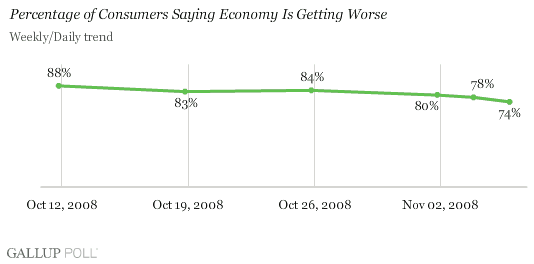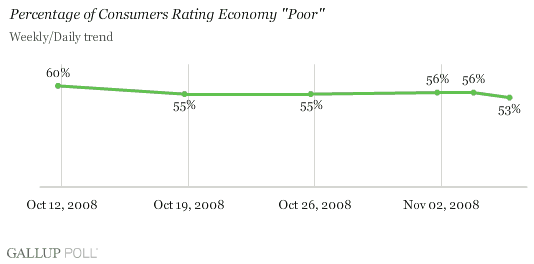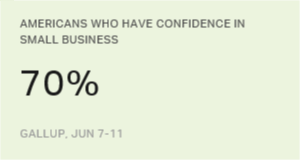PRINCETON, NJ -- President-elect Barack Obama on Friday signaled he will focus on the economy when he takes office in January. In electing Obama, Americans sought positive change on the economy, and since his election, Gallup Poll Daily tracking has documented a further uptick in U.S. consumer confidence, which has been improving since mid-October. The percentage of consumers saying the economy is "getting worse" is down four points and the percentage rating the economy "poor" is down three points in the past few days.

Slightly Fewer Saying Economy Is "Getting Worse"
During mid-October, the percentage of Americans saying the economy was getting worse reached a weekly high for the year of 88%. During the following few weeks, consumer pessimism eased steadily, as the percentage "getting worse" fell eight points to 80% for the week of Oct. 27-Nov. 2. Over the three days ending on Election Day, this measure of consumer expectations stood at 78%, and in the past three days (from Election Day to Thursday), it fell another four points to 74%.
Slightly Less Rating Economy "Poor"
In mid-October, the percentage of consumers rating current economic conditions "poor" also reached a weekly high of 60%. Pessimism eased a little in the following weeks, with the percentage "poor" declining to 56% for the week of Oct. 27-Nov. 2. Over the three days ending on Election Day, the percentage rating the economy "poor" remained at 56%, but in the three days since then, "poor" ratings have fallen another three points to 53%.

Commentary
Attributing changes in the equity markets or shifts in overall consumer confidence measures directly to events such as a presidential election -- even a historic one -- is fraught with danger. For example, the plunging Dow Jones averages of the past two days are more likely a result of investor attention turning to the real economy and anticipation of Friday's Labor Department report, which indicated that the unemployment rate surged to 6.5% in October.
Similarly, many factors are affecting overall consumer confidence. Plunging gas prices are a strong positive for Main Street. So is the stabilization of the U.S. banking system. On the other hand, there are several highly negative forces affecting the consumer, ranging from the continuing housing debacle to the consumer credit crunch and the growing jobs crisis.
Still, it seems as though there is a significant vacuum in economic leadership at this time. The events of the past couple of months thrust the federal government into a new and much larger role in the functioning of the U.S. economy. And right now, Americans realize the rules of the game will change, but don't know how they will change.
President-elect Obama has a major opportunity to fill this vacuum -- but how quickly he can do so is not clear. Speaking Friday after his highly publicized meetings with many of his economic advisers, Obama repeatedly noted that the United States has only one president at a time. In this regard, he is clearly limited as to what he can do between now and his inauguration. This limitation on his ability to provide new economic leadership for the nation -- as president-elect -- may have a significant impact on the direction of overall consumer confidence during the days and weeks ahead.
Survey Methods
Gallup is interviewing no fewer than 1,000 U.S. adults nationwide each day during 2008. The economic questions analyzed in this report are asked of a random half-sample of respondents each day.
The questions for individual weeks are based on combined data of approximately 3,000 interviews for individual weeks from Oct. 6-12 to Oct. 27-Nov. 2, 2008. For results based on these samples, the maximum margin of sampling error is ±2 percentage points.
The questions reported on a three-day rolling basis combine data of approximately 1,500 interviews from Nov. 2-4 and Nov. 4-6, 2008. For results based on these samples, the maximum margin of sampling error is ±3 percentage points.
Interviews are conducted with respondents on land-line telephones (for respondents with a land-line telephone) and cellular phones (for respondents who are cell-phone only).
In addition to sampling error, question wording and practical difficulties in conducting surveys can introduce error or bias into the findings of public opinion polls.
